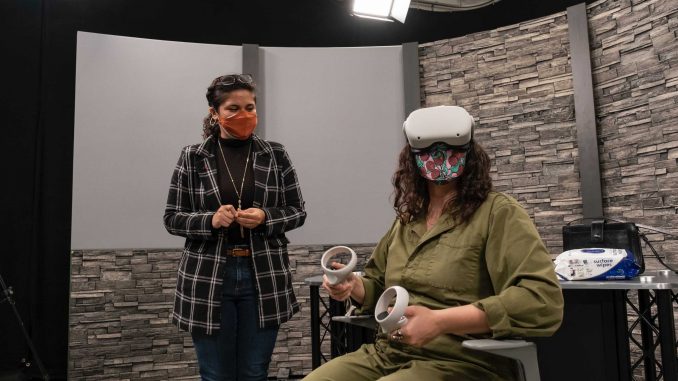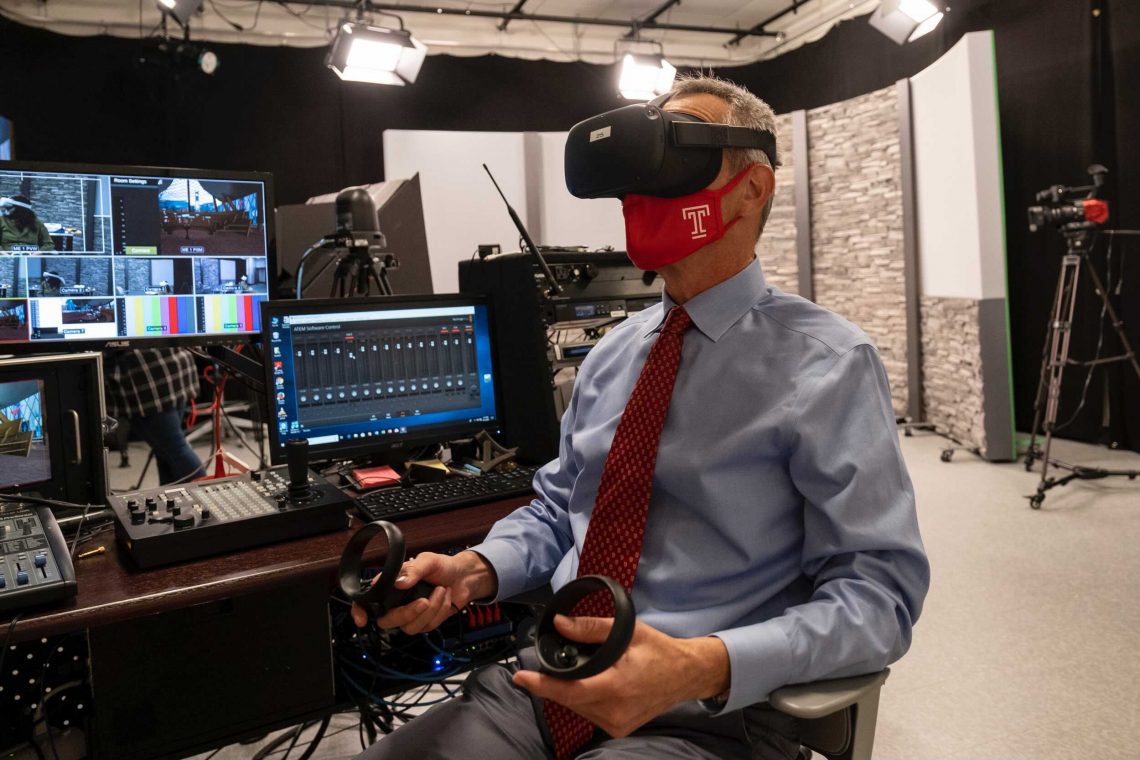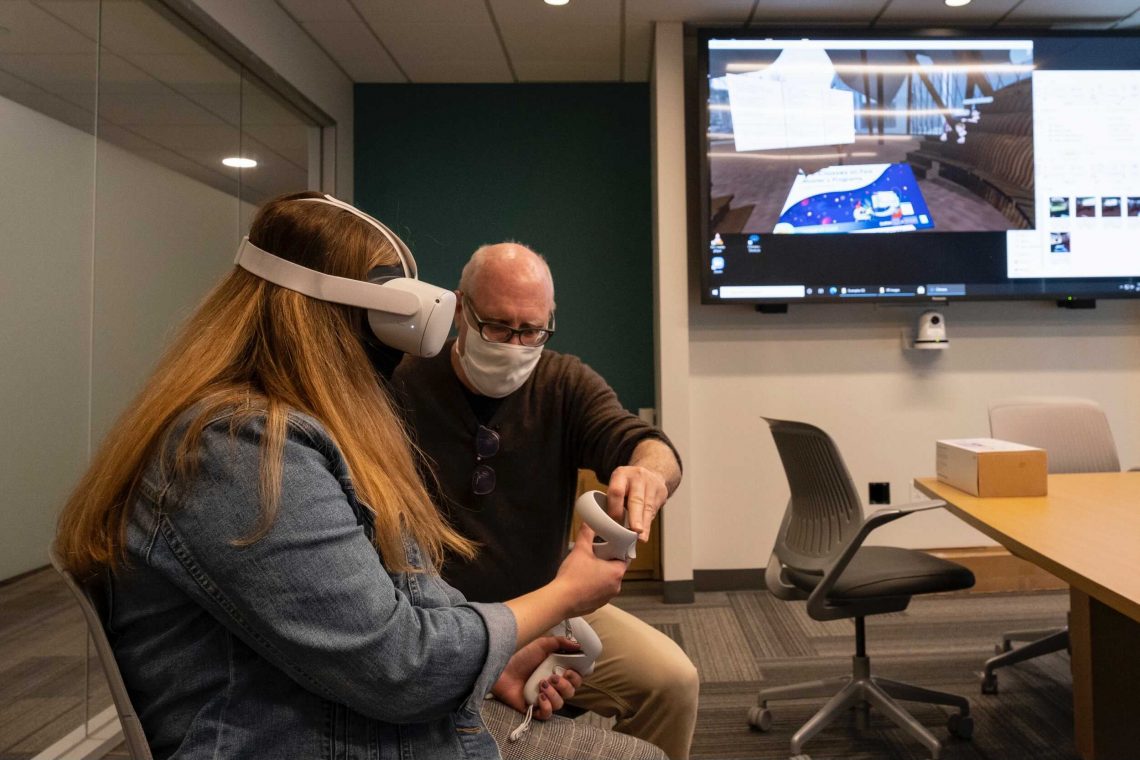
As Divya Pawar sat in her Fintech, Blockchain and Digital Disruption class listening to the lecture, she was able to get a good view of Pollet Walk from her seat. When class ended, she took off her Oculus Quest Virtual Reality headset and continued working at home in her off-campus apartment.
“It’s like you’re in a Temple classroom, like you’re sitting with your classmates,” said Pawar, a master’s of business administration student. “It was an amazing experience, it kind of transforms your space.”
In March 2020, the Fox School of Business first held Fintech, Blockchain and Digital Disruption, a graduate-level course that is offered once per year and is among the first MBA-level courses to feature a VR format among colleges and universities in the United States. Although the course operates virtually, it incorporates classroom discussions along with virtual visual elements from Temple’s Main Campus that create an environment comparable to the traditional, on-campus experience.
Students in the class learn about the ways advancements in technology affect financial services and other industries. Planning for the course began in 2018.
To keep students active in their classes, Fox has held only synchronous online classes since Temple primarily transitioned to online learning in March 2020, said Ronald Anderson, the dean of the Fox School of Business. However, he believes that once students get past initial feelings of Zoom fatigue, they enjoy the convenience of online learning despite wanting the traditional college experience even after the pandemic ends.
“I think the students want to be on campus,” Anderson said. “But I think it’s alright, for some courses, if they take their classes in their apartment or in their dorm room.”

Fox partnered with The Glimpse Group, a virtual reality platform company, and designed the virtual experience to resemble a traditional classroom setting.
Students can participate in Fintech, Blockchain and Digital Disruption remotely by wearing Oculus Quest VR headsets. With the headsets on, students sit at virtual seats in a lecture hall, surrounded by avatars of other members of the class, and can talk to one another through the headsets as they get views of Temple’s Main Campus outside the lecture hall’s windows.
Pawar enjoys feeling a part of a nearly traditional classroom experience while taking her class at an off-campus apartment.
“It kind of bridges the gap that has been missing due to the pandemic,” Pawar said. “You can see classmates sitting around desks and you can look over and talk to them how you’d talk to them in real class.”
Students receive the Oculus Headsets in the mail and return them to the Fox School of Business after they complete the course.
Bora Ozkan, a finance professor, teaches Fintech, Blockchain and Digital Disruption and appears in the center of the virtual lecture hall as an avatar where he can see students raise their hands and actively engage with one another.
Despite the class operating virtually, Ozkan made efforts to simulate in-person learning to make the experience more realistic for students, he said.
“We have a board in the classroom that we type on as we go along and we have a [teaching assistant] in the classroom,” Ozkan said. “They take notes and we upload it to Canvas so students actually have a reference about what we talked about in class.”
Anderson enjoys how the course allows students to engage as the would in a traditional classroom setting, despite being in different locations.
“I could have a kid that’s sitting in South Africa and a kid sitting in California, and I’m the professor in Philadelphia, and we’re all in the same classroom,” Anderson said.
Anderson believes using VR will allow universities to offer more experimental programs and cut costs for students as they won’t have to pay to live on campus. He acknowledged VR courses may have limitations for classes that require less classroom discussion.
“I don’t think this lends itself to a math course for instance,” Anderson said. “Because if you’re one of these people who learn a lot from note taking exactly, it’s not going to work very well, unless it’s a discussion course.”
Fintech, Blockchain and Digital Disruption is only offered once per year, but Tom Lennon, Fox’s senior video production specialist, hopes to see the course grow going forward as improvements are made to the VR experience, he said.
Lennon, who helped design the course, hopes the technology of VR continues to improve so they can avoid some of the difficulties with sound and avatar placement that have risen in some classes.

“This is a model that’s working,” Lennon said. “There’s a lot of nitty-gritty where like, something glitches and now everyone’s mute button doesn’t work.”
Lennon likes the flexibility of giving students headsets to learn and feels it is similar to some traditional aspects of borrowing university materials.
“It’s like renting a textbook,” Lennon said. “We send it out to the students and if they don’t send it back they’re going to get charged.”
Adding virtual forms of education might be valuable as students continue adapting to taking classes remotely, Anderson said.
“I think that there’s a really good chance that somewhere between 30 to 40 percent of our students are going to want a large portion, maybe not 100 percent, but a large portion of their classes in a virtual environment, because of its convenience,” he added.


Be the first to comment